Heirloom Gardening for Backyard Chickens
Raising backyard chickens is becoming increasingly popular, no matter where you live. There have always been rural chickens, but now there are small and large city chickens, happily living in coops and backyards all across the country. Chickens can do a lot for you, both in the garden and in the kitchen. First off, they give you a real measure of food security and increase your resiliency. The eggs are a great bartering tool, as very few folks that we’ve talked to weren’t interested in some fresh home-raised eggs. Chickens are great for bug control, light soil tilling and fertilization. The chicken manure is very high in Nitrogen and is a great addition to your compost. Home raised eggs are some of the highest nutritional content of any chickens, including free-range. The reason is that most home raised chickens are pampered and given extra nutrition and care. It is very easy to provide a highly nutritious and healthy diet for your backyard chickens from your home garden. We will look at several heirloom vegetables, herbs and flowers that you can easily grow in your garden that will not only provide some tasty treats for your chickens, but give you some great greens as well.
Almost any of the greens and vegetables that you enjoy your chickens will love. You have probably seen them get really excited if you share salad fixings or old veggies from your refrigerator. Think of how they will get when they know that the garden is providing treats for them all of the time! You don’t have to plant a special garden just for the chickens, as they will happily devour any greens that come their way.
The question is often asked of why grow your chicken’s food, why not just buy the 50lb. bag of chicken scratch and call it good? There is nothing wrong with going this route, and realistically you will most likely need to have some commercial feed available as your garden may or may not produce enough greens and grains for your flock. This will vary depending on the size of your garden compared to the size of your flock. The real answer to growing fresh greens for your chickens is the same answer as to why you would want to grow your own garden- taste, nutrition and choice.
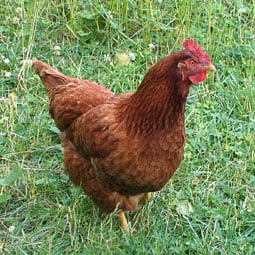
Spring Chicken
Let’s look at several varieties of vegetables and herbs that are easily grown in a home garden setting that will provide some tasty and highly nutritious greens for both you and your birds. Starting off in the cooler season with some cold-hardy greens will help jump-start the hens energy levels. Kale, Swiss Chard, mustard greens and beet tops are a great start to the season. They all like a cooler soil, sprout quickly and will provide some serious nutrition. Speaking of sprouting, sprouts are an absolute powerhouse of nutrition and are ready to eat in 4-7 days. Alfalfa sprouts are possibly the best known, but there are several different types of sprouts such as radish, mung bean and red clover that work well. Sprouts take up minimal space, use little water and need only the most basic equipment to produce a couple of pounds of fresh food. This is a technique that works especially well in the depths of winter when other greens are scarce and expensive. You can produce plenty of sprouts for yourself and a half dozen chickens from a half gallon jar with a sprouting screen lid on your kitchen sink.
Once the weather starts warming up more options open up for different vegetables and greens. Cabbage, chicory, mustards, spinach and a number of greens do well in the early spring once the soil has started warming up. These include Miner’s Lettuce, French Purslane and Aztec Red Spinach. Once the true spinach starts to bolt in the warmer weather, switch to the spinach substitutes such as red and green malabar spinach, the Aztec Red spinach and New Zealand spinach. All of these love the heat, won’t bolt and produce all through the hotter weather. Traditional winter cover crops such as alfalfa, clover, vetch and annual rye should be considered for later in the year.
If you have the space, pumpkins and squash- both summer and winter- can be excellent feed choices. Winter squash and pumpkins that can be stored until later in the winter give you an additional resource for high quality feed when nothing else is growing. Corn is another great choice, space permitting, as it is the base for the commercial feeds. Other grains that will grow well in a smaller home garden set up is Mennonite Sorghum, Amaranth and Quinoa. Don’t forget Sunflowers, as they can provide both shade and a wind break for your garden along with seeds for your girls.
Many folks don’t think of herbs when it comes to providing food for chickens, but there are some great choices here. Borage is one such, as it has lots of mineral-rich leaves as well as flowers that are edible and make excellent additions to a chicken’s diet. Comfrey is in the Borage family and is another great choice.
To help you get started, we have created a section on our website called “Backyard Chickens Collection”, appropriately enough. We list all of the varieties that are mentioned in this article to save you the time of looking throughout the website to find them. It is really easy to incorporate the chicken feed aspect into your existing gardening plan. Planting one or two extra plants of each variety for each half dozen chickens is usually sufficient, with grains such as Amaranth and sunflowers going almost exclusively to the chickens. As with most things gardening related, a little experimentation will prove the way as you see what volumes of fresh garden produce you particular flock of chickens needs.

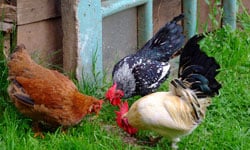




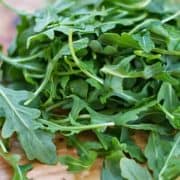
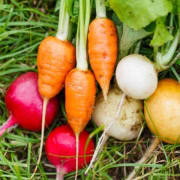
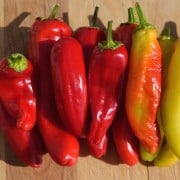
Great topic idea. I had done a little bit of research on gardening for the chickens in the past and hardly came up with as many ideas you listed in the article. This was a great read. Thx
Here in California, the pasture grass dies in summer, so the chickens don’t get access to the fresh green growth that makes those amazing orange yolks. I planted a big stand of Kale specifically to provide greens through the summer and fall (being on the north coast, it’s cool in summer so kale thrives all year long). It worked a treat and they love it!
I think you may have glossed over the nutritional requirements a little, though. Laying hens need lots of protein (about 16% or more of their diet) and calcium. These are hard to provide in the garden. Also, “chicken scratch” isn’t a balanced food – too much corn, not enough protein. The reality is that a commercially formulated chicken feed is nearly always required for proper basic nutrition. The garden provides a wonderful supplement that improves their health and makes them happier!
Thanks for all the useful information!
Hello Tim-
Thanks for your comments! We have planted Kale in the spring and grown it well past first frost and our summers are over 105F for a month, sometimes more. Kale is much more than just a cool season green, and the chickens and horses love it.
I wasn’t trying to gloss over the nutritional needs of the chickens, but introduce the idea of growing varied greens and grains to supplement the chickens diet. That is why grains- sorghum, amaranth, quinoa, sunflowers, Huauzontle (Aztec Red Spinach), corn and especially sprouts are talked about in some detail, as they do provide more than the minimum protein content laying chickens need. I agree completely that commercial chicken scratch is not a balanced grain ration at all, and it is much more nutritious to grow some higher protein grains along with some varied greens in your garden. Starting with a healthy, well-mineralized and biologically active soil will ensure that the greens and grains grown are much more nutritious than anything that is available at the feed store.
Thanks, Jason!
We have talked with several of our customers who had asked about doing something in the garden to help the chickens, so we saw the need for some more information.
Let us know how it works for you!
This is article was a great idea. I’ve been wanting to grow things for my chickens, but it is very time consuming trying to find information on things good for them that can be grown in a home garden. Of course I knew they loved tomatoes and cucumbers (especially cucumbers!) but this list is so much more comprehensive than any I have seen. Thanks!
Hello Katherine-
Thanks for the comments and please let us know how your chickens like the treats!
I loved the information.
Don
Thanks, Don!
We are hoping to start raising chickens soon. We are researching breeds and feeds and coops, etc. We also love gardening and have space for a large garden thanks for the info.
You are welcome Deanna, hope this helps.